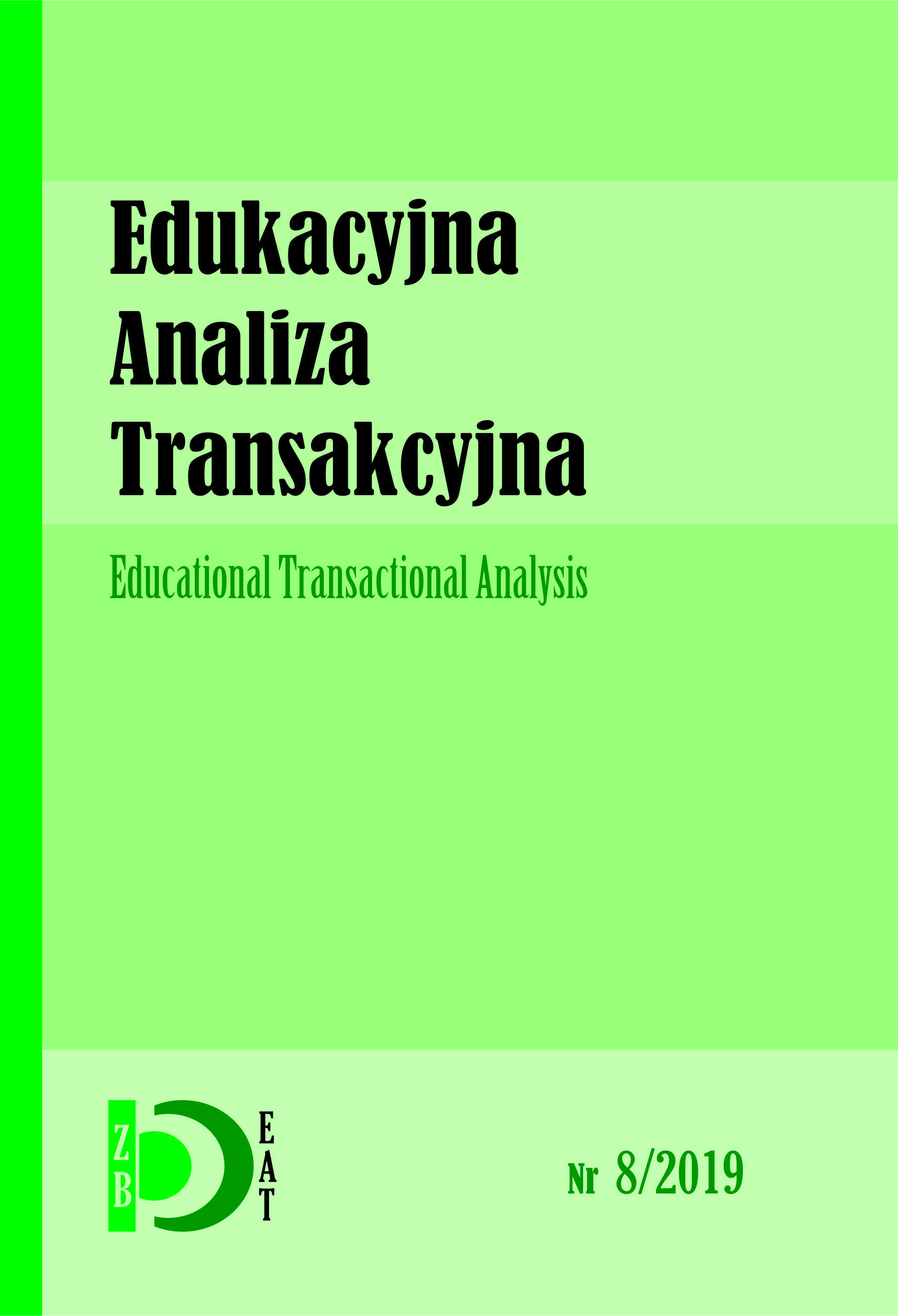Developing social skills of pre-school and early-school children on the basis of transactional analysis assumptions. The characteristics of the Little Professor University programme
DOI:
https://doi.org/10.16926/eat.2019.08.01Keywords:
educational transactional analysis, social skills, autonomy, passivityAbstract
The article presents the characteristics of The Little Professor University programme, whose aim is to support the development of social skills of pre-school and early-school children. The programme’s assumptions are based on the theoretical constructs of transactional analysis. The main objective of the programme is the development of its participants’ autonomy and preventing the use of passive strategies the way TA understands them. The text shows both a theoretical framework of the project, its practical realisation, and a general evaluation analysis of the first meeting cycle.
Downloads
References
Barrow, G. (2007). Wonderful World, Beautiful People: Reframing transactional analysis as positive psychology. Transactional Analysis Journal, 37, 206– 209, http://dx.doi.org/10.1177/036215370703700304.
Barrow, G. (2016). Educational Transactional Analysis. Underpinning assump- tions, principles and philosophy. W: Barrow, G., Nawton, T. (eds.) (2016). Educational Transactional Analysis. An international guide to theory and practice (s. 14–28). New York: Routledge.
Barrow, G., Nawton, T. (eds.) (2016). Educational Transactional Analysis. An international guide to theory and practice. New York: Routledge.
Bellah, R.N. (2011). Religion in Human Evolution: From the Paleolithic to the Axial Age. Cambridge: Belknap Press.
Berne, E. (1994). W co grają ludzie. Psychologia stosunków międzyludzkich. Warszawa: PWN.
Berne, E. (2005). Dzień dobry... i co dalej? Poznań: REBIS.
Emmerton, N., Newton, T. (2004). The Journey of Educational Transactional Analysis from Beginnings to the Present. Transactional Analysis Journal, 34 (3), 283–291, http://dx.doi.org/10.1177/036215370403400314.
Erskine, R.G. (2002). Relational Needs. EATA Newsletter, 73, 5–9.
Ilg, F.L, Ames, L.B., Baker S.M. (2007). Rozwój psychiczny dziecka od 0 do 10 lat. Gdańsk: Gdańskie Wydawnictwo Psychologiczne.
James, M., Jongeward, D. (2003). Narodzić się, by wygrać. Analiza transakcyjna na co dzień. Poznań: REBIS.
Miljkovic, N. (2016). Relational needs in education. W: Barrow, G., Nawton, T. (eds.) (2016). Educational Transactional Analysis. An international guide to theory and practice (s. 68–78). New York: Routledge.
Moiso, C. (1998) Being and Belonging. The Script, 28(9), 1–7.
Newton, T. (2016). Turning to resilience and power. Metaphor and meaning in relational learning. W: Barrow, G., Nawton, T. (eds.) (2016). Educational Transactional Analysis. An international guide to theory and practice (s. 29– 38). New York: Routledge.
Pierre, N. (2016). Contracting for learning. W: Barrow, G., Nawton, T. (eds.) (2016). Educational Transactional Analysis. An international guide to theory and practice (s. 123–134). New York: Routledge
Pierzchała, A. (2013). Pasywność w szkole. Diagnoza zjawiska z punktu widzenia analizy transakcyjnej. (English: School passivity. Diagnosis of the phenome- non from the transactional analysis point of view). Częstochowa: Wydawnic- two im. Stanisława Podobińskiego Akademii im. Jana Długosza w Często- chowie.
Rubacha, K. (2008). Metodologia badań nad edukacją. Warszawa: Wydawnic- twa Akademickie i Profesjonalne.
Schiff, A.W., Schiff, J.L. (1971) Passivity. Transactional Analysis Journal, 1 (1), 71–78, http://dx.doi.org/10.1177/036215377100100114.
Schiff, J., i in. (1975). Cathexis reader. New York: Harper & Row, Publisher.
Stewart, I., Joines, V. (2009). TA Today. A New Introduction to Transactional Analysis. Nottingham, England and Chapel Hill, North Carolina, USA: Life- space Publishing.
Temple S. (1999). Functional Fluency for Educational Transactional Analysts. Transactional Analysis Journal, 29 (3), 164–174, http://dx.doi.org/10.1177/ 036215379902900302.
Temple S. (2002). Functional Fluency. Zeitschrift für Transaktionsanalyse, 4, 251–269.
Temple S. (2004). Update On The Functional Fluency Model in Education. Tran- sactional Analysis Journal, 34 (3), 197–204, http://dx.doi.org/10.1177/ 036215370403400302.
Downloads
Published
How to Cite
Issue
Section
License
I am aware that the Educational Transactional Analysis journal is published under a Creative Commons license - Attribution (https://creativecommons.org/licenses/by/4.0/legalcode).
By submitting the article, I agree to make it available under this license

